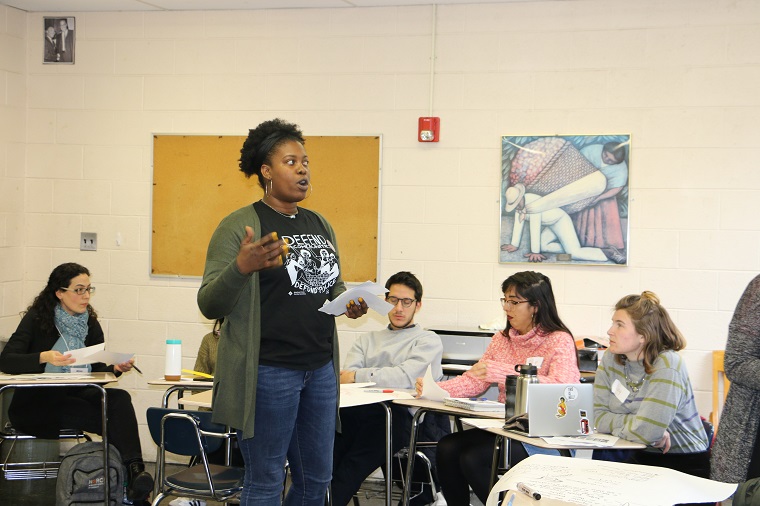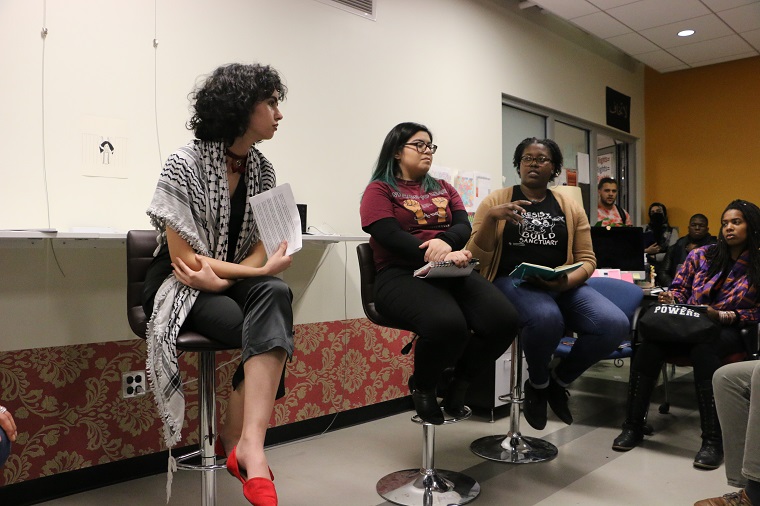AFSC is helping communities put a stop to a federal program that profiles and surveils Muslims.
By Mary Zerkel
Have you ever been angered by U.S. foreign policy? Grown facial hair? Worshiped at a mosque? If you said “yes” to any of these questions—you might be considered a potential violent extremist by the U.S. government under its racist Countering Violent Extremism (CVE) program.
CVE is an Obama-era initiative within the Department of Homeland Security that purports to prevent people from becoming “terrorists.” The program recruits trusted community members—including teachers, mental health practitioners, and imams— to be informants by asking them to identify people taking part in what CVE considers suspicious activity and report them to law enforcement.
But the reality is: “It is simply not possible to identify ‘markers’ of radicalization that allow early identification of would-be terrorists,” says Faiza Patel, co-director of the Brennan Center for Justice in her report “Rethinking Radicalization.”
In fact, CVE is based on flawed studies on the “radicalization” process. It uses indicators that disproportionately target Muslim and Arab communities, effectively criminalizing everyday behavior, especially among young people.
Imagine your child needs emotional support in school and visits the school counselor. If the school was receiving CVE funding, that counselor may be trained to watch for signs that your child might have “social alienation and anxiety, a sense of being treated unjustly or outrage about U.S. foreign policy,” which, according to CVE guidelines, indicates the potential for radicalization. Of course, many young people would go to a counselor exactly because they have those feelings. But these vague indicators—along with more racialized ones, like “wearing traditional Muslim attire”—demonstrate the dangerous, discriminatory nature of CVE.
AFSC’s Communities Against Islamophobia project supports Muslim and Arab-led organizing to stop CVE in communities around the U.S. Because CVE programs are essentially surveillance programs, recent iterations of the program have rebranded, using progressive-sounding language to obscure their true intent. In Illinois, for instance, CVE is called the “Targeted Violence Prevention Program,” which conducts “bystander-gatekeeper trainings” and “hate crime focus groups.”
Over the past two years, AFSC has trained more than 1,800 people on CVE in Illinois, Indiana, Massachusetts, Pennsylvania, and North Carolina—and how they can work to identify and stop it.
In Illinois, we helped build the StopCVE Chicago Coalition, which recently released an extensive report on CVE in Chicago based on months of investigative research and multiple Freedom of Information Act (FOIA) requests. The report, “Suspected & Surveilled,” details how CVE money is being used in the state, the faulty academic research behind it, and the ways it targets the Muslim and Arab communities.
Read the report: afsc.org/stopCVEreport
AFSC and partners are beginning to see the impact of our efforts. In May, Chicago’s StopCVE coalition won a major victory when media attention generated by our report forced the director of Illinois’ CVE program to step down. As of this writing, there were no plans to replace him.
We also helped convince a local university to change its research protocol so that any study on the Muslim and Arab community would require consultation with members of the community before moving forward.
And our coalition in Chicago continues to grow, with a membership that includes 11 Muslim and Arab community partner organizations—despite fears of being retaliated against by law enforcement for speaking out against CVE. We’re also seeing more groups that work to stop racism and violence in policing taking on CVE as an issue as part of intersectional organizing efforts.
AFSC’s Communities Against Islamophobia Project will continue to stand with Muslims and Arabs across the country to stop CVE—and build communities where all people can live in safety and peace.
To learn more about our efforts, visit: afsc.org/noislamophobia

Responding to Islamophobia in schools
Since President Trump’s election, reports of bullying and harassment of Muslim students have been on the rise. In response to growing concern among families, educators, and administrators, AFSC’s Communities Against Islamophobia project launched “Countering Anti-Muslim Racism in Schools,” a school curriculum developed with the University of Illinois-Chicago Department of Education.
The curriculum, created for grades six to 12, leads students through six lessons examining individual and institutional forms of racism, the impacts of Islamophobia, and the dangers of stereotypes. Students also learn critical media analysis and how to respond to both individual and institutional racism.
The curriculum, which is aligned with the Common Core standards, will be used in at least two states this upcoming school year. In Chicago, AFSC trains teachers on the curriculum with UIC-Chicago offering professional development credits. And in Cambridge, Massachusetts, we’re working with the Muslim Justice League and the Massachusetts Teachers Association to train teachers on the curriculum.
More: creatingculturalcompetencies.com/curriculum.html
